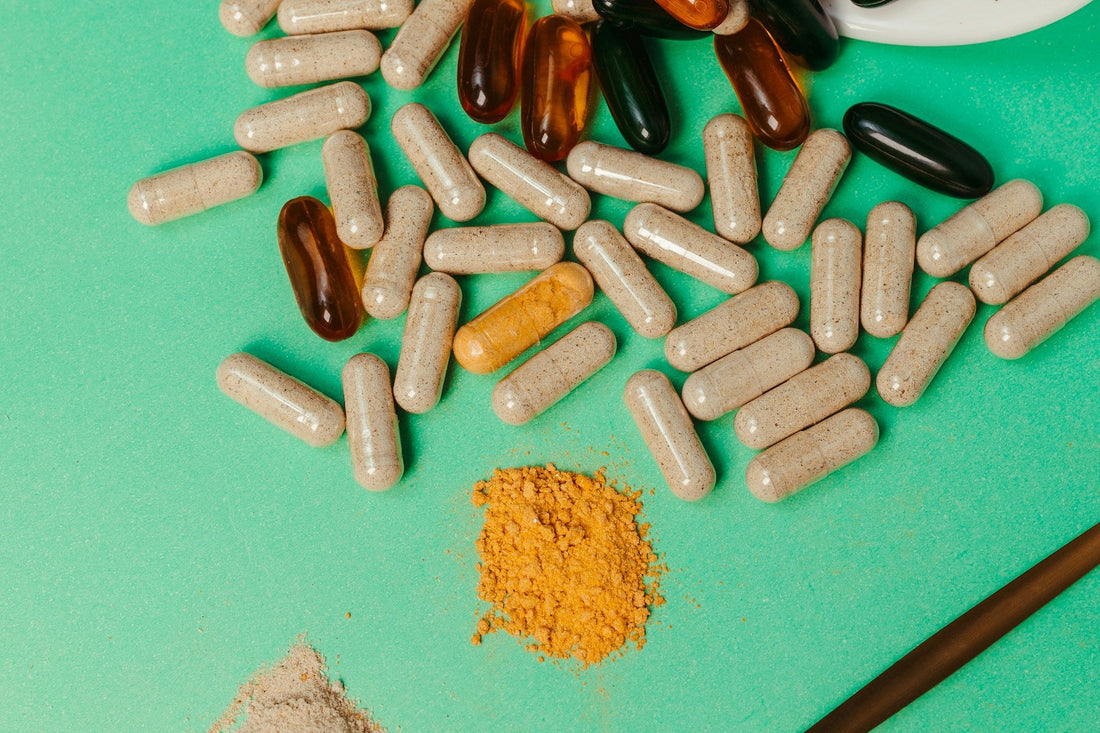
Hemorrhoids and Fiber Supplements: Understanding Their Role in Relief
Share
Experiencing hemorrhoids can be uncomfortable and even painful, but one effective way to ease symptoms is by incorporating fiber supplements into your routine. Fiber is essential for softening stools and promoting regular bowel movements, which can significantly reduce the discomfort associated with hemorrhoids. By increasing your fiber intake, you create less strain during bowel movements, helping to prevent worsening of the condition.
For many people, achieving the recommended daily fiber intake through diet alone can be challenging. This is where fiber supplements become a valuable ally. They help to ensure you get adequate fiber, which is crucial for mitigating the symptoms of hemorrhoids and supporting overall digestive health. Among the options available, Hem Healer stands out as a 100% natural blend of botanical herbs specifically designed to address both the discomfort and underlying causes of hemorrhoids.
By choosing Hem Healer, you benefit from a supplement tailored to reduce pain, swelling, and bleeding. This product is effective for both men and women, providing a holistic approach to managing hemorrhoids. When combined with dietary fiber, Hem Healer can enhance your efforts to find lasting relief and improve your quality of life.
Understanding Hemorrhoids
Hemorrhoids are swollen veins located in the anal canal that can cause discomfort and various symptoms. Familiarizing yourself with their types, symptoms, causes, and risk factors is essential for effective management and treatment.
Types and Symptoms
Hemorrhoids can be classified into two types: external and internal. External hemorrhoids appear under the skin around the anus and can cause symptoms like itching, pain, and swelling. They may also bleed when irritated. Internal hemorrhoids, found inside the rectum, might not always be noticeable. Symptoms include rectal bleeding, which is often seen as bright red blood during bowel movements.
You may also experience prolapse, where internal hemorrhoids protrude through the anus. Understanding these differences can help you identify the specific type you're dealing with, allowing for targeted treatment. Using natural supplements like Hem Healer can effectively alleviate the pain, bleeding, and swelling associated with these conditions.
Causes and Risk Factors
A variety of factors contribute to the development of hemorrhoids. Aging naturally weakens the tissues in the anal canal, leading to increased risk. Conditions like chronic constipation and obesity can add pressure to the veins, exacerbating the issue.
Straining during bowel movements, often due to difficulty passing stools, is another significant risk factor. Additionally, lifestyle choices such as prolonged sitting or engaging in anal intercourse can increase vulnerability.
Incorporating dietary changes, such as higher fiber intake, and using supplements like Hem Healer can help support vein health and combat these risk factors effectively.
The Role of Fiber in Managing Hemorrhoids
Fiber plays a crucial role in the management of hemorrhoids by promoting regular bowel movements, reducing straining, and alleviating symptoms. Both soluble and insoluble fibers offer unique benefits that can help ease discomfort associated with this condition.
Types of Fiber
There are two main types of fiber: soluble and insoluble.
- Soluble Fiber dissolves in water, forming a gel-like consistency. This type can help soften the stool, making it easier to pass. Sources include oatmeal, beans, apples, and pears.
- Insoluble Fiber does not dissolve in water and adds bulk to the stool. This promotes regularity and can be found in foods like whole grains, vegetables, and nuts.
Incorporating a variety of fiber-rich foods helps ensure you receive both types, which can be beneficial in managing hemorrhoids.
Recommended Fiber Intake
For optimal digestion and hemorrhoid management, aiming for a daily intake of about 25-30 grams of fiber is recommended.
You can achieve this by:
- Eating whole grains such as barley and brown rice.
- Including a range of fruits and vegetables in your diet, focusing on those high in fiber.
- Adding legumes and nuts to your meals for an extra boost.
Additionally, staying hydrated with adequate water intake complements fiber consumption, enhancing its effectiveness. Hem Healer offers a natural supplement that supports fiber intake, helping to reduce the pain, swelling, and bleeding associated with hemorrhoids. Using a supplement like Hem Healer alongside a fiber-rich diet can further improve your digestive health and comfort.
Dietary Changes and Natural Remedies
Making specific dietary changes and exploring natural remedies can significantly alleviate hemorrhoid symptoms. Focusing on fiber intake and utilizing home treatments will assist you in managing discomfort effectively.
Implementing a Fiber-Rich Diet
A fiber-rich diet is essential for preventing constipation and reducing strain during bowel movements. You should aim for 20 to 30 grams of dietary fiber daily. Good sources include fruits, vegetables, legumes, and whole grains. Foods like oats, whole wheat bread, and brown rice offer beneficial fiber content.
Processed foods often lack fiber and can exacerbate symptoms. Limit your intake of these items while increasing fiber-rich foods. You can track your fiber intake using tools like food diaries or apps to stay aligned with dietary guidelines.
For those needing extra support, fiber supplements can help. Hem Healer offers a natural blend of botanical herbs that can complement your diet, working to reduce swelling and pain associated with hemorrhoids.
Home Remedies for Symptom Relief
Incorporating home remedies can also be very effective. A sitz bath—sitting in warm water—can provide immediate comfort and promote healing. Aim for 10 to 15 minutes, several times a day.
Witch hazel is known for its soothing properties and can be applied topically to relieve itching and inflammation. Additionally, aloe vera is beneficial for its anti-inflammatory effects.
Consider foods rich in flavonoids and tannins, like berries or citrus fruits, which may help strengthen blood vessels. Supplements containing diosmin and hesperidin may also offer benefits. Always consult your healthcare provider before starting any new treatment or supplement regimen to ensure it's suitable for your specific needs.
Medical Treatments and Procedures
Managing hemorrhoids often requires a combination of medical treatments and procedures. Understanding the options available can help you make informed decisions for effective relief.
Over-the-Counter Products
Over-the-counter (OTC) products are often the first line of defense against hemorrhoids. These include pain relievers like ibuprofen and aspirin, which can alleviate discomfort. Stool softeners, such as calcium polycarbophil, are also essential, as they ease bowel movements and reduce straining.
Additionally, fiber supplements like methylcellulose and psyllium can help bulk your stool, making it easier to pass. Incorporating regular sitz baths can soothe inflamed areas, providing temporary relief. Hem Healer offers a natural option that complements these treatments by reducing pain and swelling with its unique blend of botanical herbs.
Surgical and Non-Surgical Options
If at-home treatments are insufficient, various medical procedures can effectively treat hemorrhoids. Rubber band ligation is a common non-surgical method. This involves placing a rubber band around the base of the hemorrhoid to cut off its blood supply, causing it to shrink and fall off within a few days.
For more severe cases, surgical options are available, including hemorrhoidectomy, where the hemorrhoids are surgically removed. These procedures can help alleviate persistent symptoms, particularly if you experience complications like anemia from chronic bleeding. Always consult a healthcare professional to identify the best approach for your situation.
Prevention and Long-Term Management
Implementing effective prevention strategies and long-term management practices can significantly improve your comfort and reduce hemorrhoid occurrences. Key adjustments in your lifestyle and habits play a crucial role.
Lifestyle Adjustments
To prevent hemorrhoids, focus on dietary changes that promote regular bowel movements and alleviate constipation. Increase your fiber intake to about 25-35 grams daily by incorporating fiber-rich foods like prunes, broccoli, berries, artichokes, sweet potatoes, tomatoes, bananas, squash, bell peppers, celery, and cucumbers into your meals. Fiber supplements, such as those containing wheat dextrin or inulin, can help boost fiber levels, promoting healthy digestion.
Stay hydrated by drinking plenty of water, which aids in softening stool and preventing straining during bowel movements. This can help minimize the risk of hemorrhoid bleeding. Regular physical activity is essential in maintaining a healthy weight and reducing obesity, which can increase pressure on vein walls.
Be cautious with laxatives, as overuse can cause dependence and worsen constipation. Instead, opt for natural remedies and focus on maintaining a balanced diet. Hem Healer is particularly effective, as it combines 100% natural botanical herbs to alleviate pain and swelling linked to hemorrhoids.
When to See a Healthcare Provider
Monitoring your symptoms is vital in managing hemorrhoids effectively. You should see a healthcare provider if you experience persistent pain, bleeding during bowel movements, or significant changes in bowel habits. These symptoms may indicate a more severe condition that requires professional assessment.
If you notice excessive gas or bloating after making dietary changes, discuss these issues with your provider. They can recommend appropriate modifications to your diet or suggest alternatives to fiber supplements.
If you’re struggling with hemorrhoids despite lifestyle changes, consider supplementing with Hem Healer, which is designed for both men and women to ease hemorrhoid symptoms naturally. Timely consultation with your healthcare provider can help you stay on track for long-term relief and manage any potential complications.

